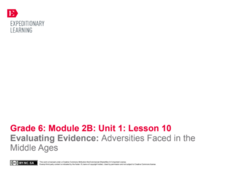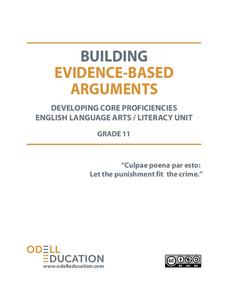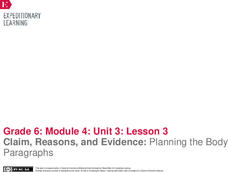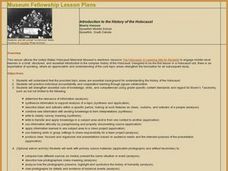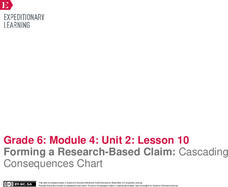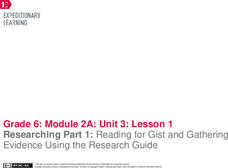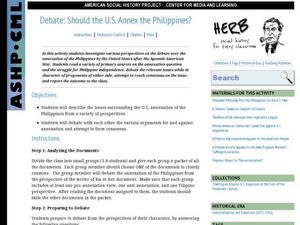EngageNY
Evaluating Evidence: Adversities Faced in the Middle Ages
How is that relevant? Scholars gain an understanding of the words relevant and compelling. They then go back to the End of Unit 1 Assessment Prompt: Adversity in the Middle Ages and look at the second bullet that pertains to relevant and...
Odell Education
Building Evidence-Based Arguments: "Cuplae poena par esto: Let the punishment fit the crime."
Should a criminal's punishment match the crime? An argumentative writing plan explores this question as class members investigate a variety of mixed-medium sources by experts in the field, form evidence-based claims, and support them...
Making Evidence-Based Claims: Grade 7
New ReviewThe most effective way to support an argument is with clear and relevant evidence. As seventh graders read and listen to Cesar Chavez's California Commonwealth Club Address, they work through five sections of a textual analysis unit,...
EngageNY
Claim, Reasons, and Evidence: Planning the Body Paragraphs
Planning is the key to success. Scholars continue planning their essays by adding reasons to their Planning My Argument graphic organizers. Additionally, pupils analyze a body paragraph from a model position paper, identifying the...
EngageNY
Grade 9 ELA Module 2, Unit 2, Lesson 19
Now that readers can see the full scope of Sophocles' Oedipus the King, they can draw connections between the dramatic ending and the textual evidence throughout the Greek tragedy. As they prepare for the unit assessment writing prompt,...
E Reading Worksheets
Tone Worksheet 4
A poet's word choice can be the difference between a poem that is merely sad, and a poem full of heartbreaking regret. Middle schoolers discern the tone in four different poems, noting the relevant textual evidence that supports each...
Curated OER
Introduction to the History of the Holocaust
The Holocaust is unbelievable! Examine this piece of history with your class. Using the Internet, research groups determine the relevance of information presented, compare how different sites present the same information, synthesize...
EngageNY
Finding Relevant Information and Asking Research Questions: The Benefits of Video Games
Video games may not be so bad after all. As scholars read the text "The Many Benefits, for Kids, of Playing Video Games," they summarize the gist in their researchers' notebooks. Next, pupils draft supporting research questions based on...
EngageNY
Research Tasks: New Words, Relevant Information, Revision
Word builders. Scholars participate in a mini lesson about affixes. They then complete a research vocabulary organizer and share their definitions of the words with the class. They gather more evidence for their research from the...
Curated OER
Evidence of Evolution by Natural Selection: Testable Hypotheses #2
These slides will activate prior knowledge with real-life examples of natural selection. The predictions and outcomes for those examples are explained. Your students will like the information about the relevant chromosome tests that can...
EngageNY
Forming a Research-Based Claim: Cascading Consequences Chart
Is it relevant? Scholars choose a resource from their folders and search for relevant information about the harmful and beneficial consequences of DDT. They mark benefits in one color and harmful effects with another color. They then add...
University of Delaware
Constructing Text-Based Arguments About Social Issues
Eighth graders take a stand on a variety of controversial topics with a lesson on argumentative writing. As they view an informative presentation and work with collaborative groups, they decide which side of each argument they want to...
EngageNY
Researching Part 1: Reading for Gist and Gathering Evidence Using the Research Guide
If only life came with an owner's manual. Pupils assemble with their research teams to discuss which of Steve Jobs' rules to live by most resonates with them. Scholars also read informational texts in pursuit of finding the gist and...
EngageNY
Finding Relevant Information and Asking Research Questions: The Big Thirst
Let's get to the gist. As scholars continue their study of Charles Fishman's The Big Thirst, they practice writing the gist of the text. Additionally, pupils add notes about the industrial uses of water to their researcher's notebooks.
Curated OER
Helping Homeschoolers: Rigorous and Relevant Writing
Maximize the strengths of the homeschooling relationship to improve the quality and focus of your child's writing.
Curated OER
Debate: Should the U.S. Annex the Philippines?
Building an argument with supporting evidence is a vital skill. Learners engage in a debate over the annexation of the Philippines after the Spanish-American War. They take on the perspective of an individual from that time period,...
Global Oneness Project
Repairing the Fabric of Democracy
During elections, headlines constantly lament the issue of low voter turnout. Help class members understand why this is such an important topic with relevant articles, a discussion of both sides of the issue, and a reflective essay.
EngageNY
Evaluating an Argument in The Big Thirst
Don't argue with me! Scholars first evaluate the argument in The Big Thirst. Learners work with partners to determine if the text supplies enough evidence to support the claim. They then complete a Tracing an Argument Note catcher for...
EngageNY
Grade 9 ELA Module 2, Unit 2, Lesson 17
As Oedipus the King approaches its tragic conclusion, high schoolers discuss Oedipus' reaction to seeing his wife's body. They also examine how Sophocles structures the scene to contribute to the central idea of his play.
EngageNY
Evaluating an Argument: The Joy of Hunting
After listening to "Interview with an Organic Farmer," class members identify the claim the farmer makes in his interview. They use lined paper to create a four-square organizer for relevant evidence, sufficient evidence, irrelevant...
Polk Bros Foundation
Common Core Constructed Response Organizer
Get your writers ready to compose a constructed response essay in response to either an informational or fictional text. Pupils note down the big idea they wish to address as well as up to nine examples from the text that they wish to...
University of Minnesota
Dendritic Spines Lab
This is your brain on drugs ... literally! Your neuroscientists-in-training examine the evidence of drug use on the human brain and how neurons change their connectivity when altered by drugs. They then work together to create testing...
Curated OER
A Colony is Born : Lesson 5 - Dear Mem
Discover colonies! Young historians will listen to a primary source journal entry read aloud with a backdrop of wave sounds. They discuss the entry, add historical facts to a chart and personal insights to another. Then they listen to...
iCivics
We The Jury
A jury must decide: are the names of two businesses so similar that one is hurt by customer confusion? Learners play the role of a juror who must decide—and convince others—whether Trio Taco and Trio Pizza are too similar. Using...


